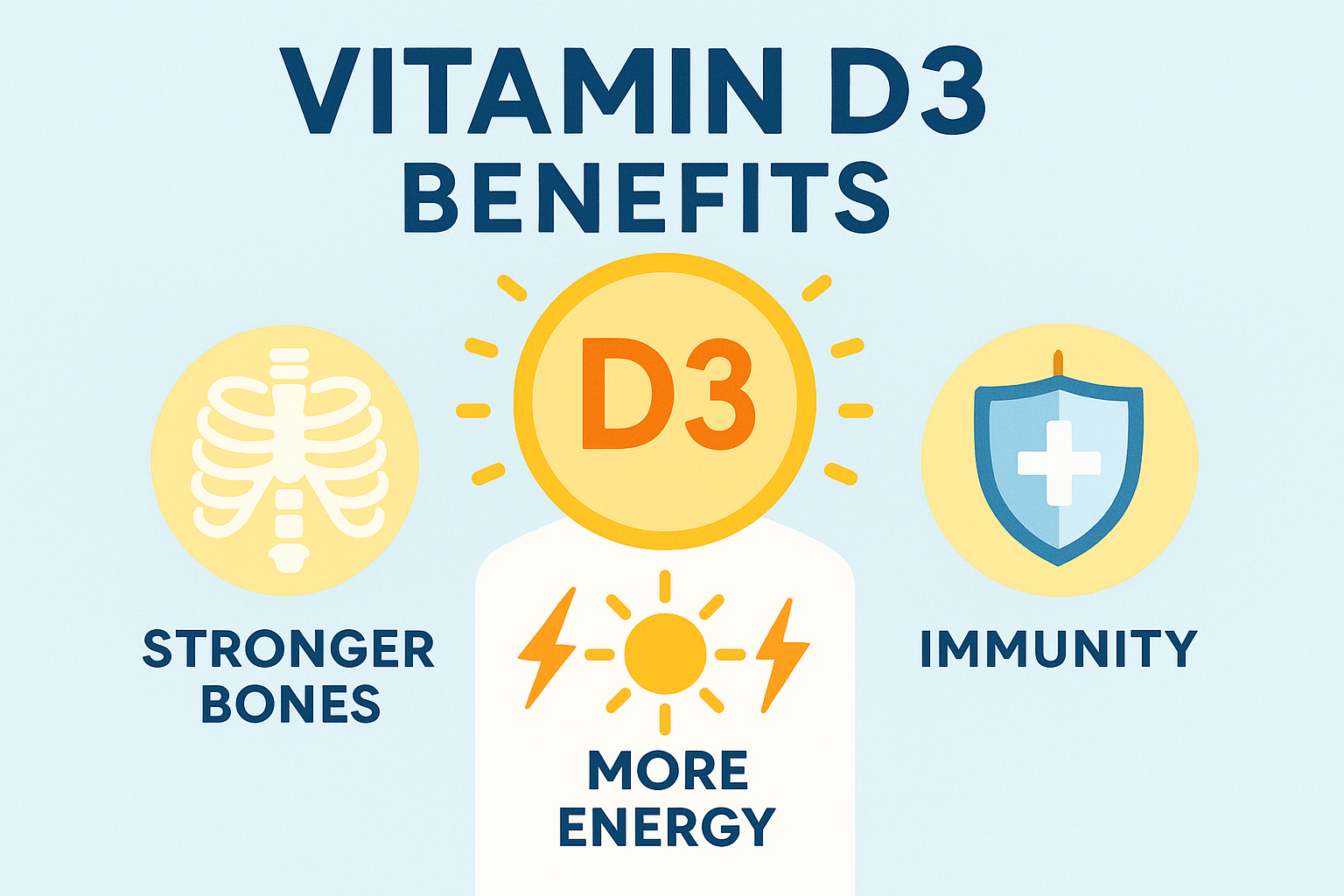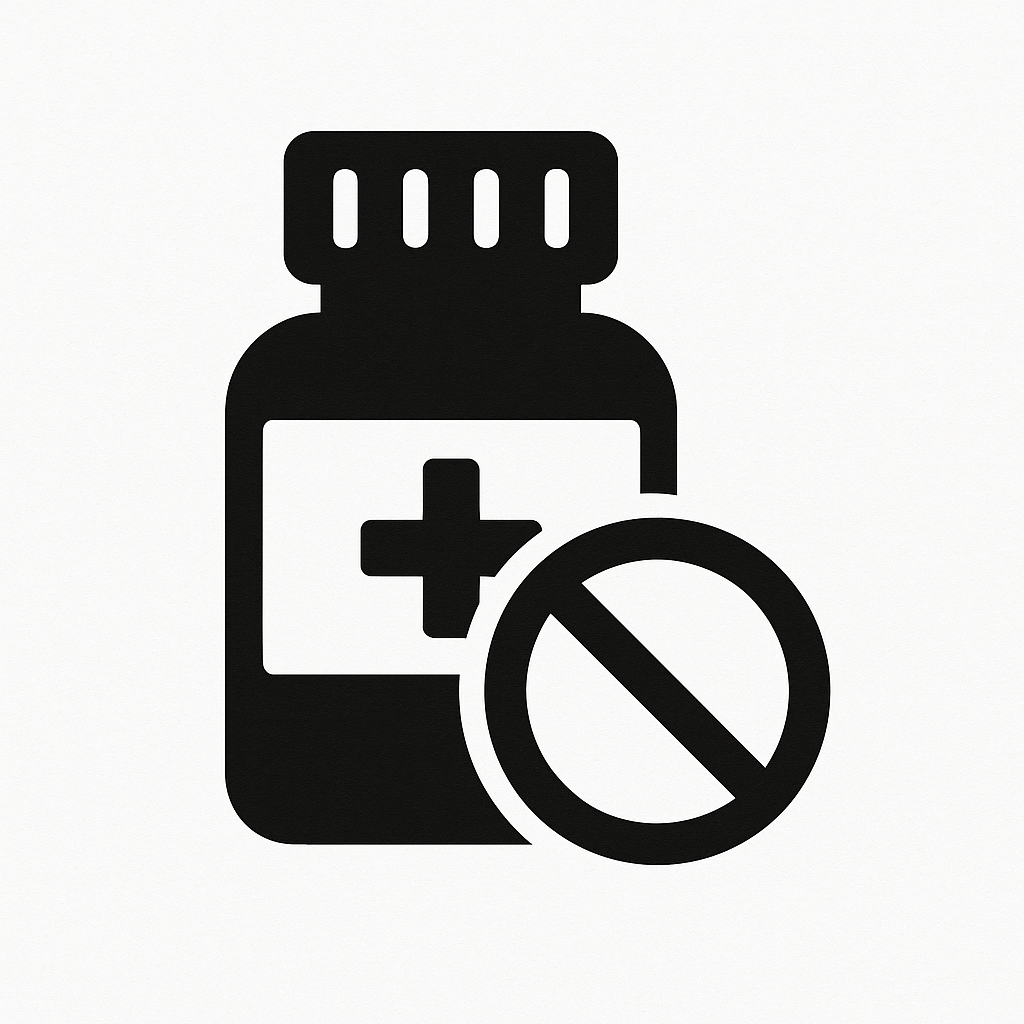
Vitamin D3 Benefits: From Stronger Bones to More Energy & Immunity
The Sunshine Vitamin's Hidden Power
Vitamin D3, often called the "sunshine vitamin" because your skin produces it when exposed to sunlight, is one of the most underestimated nutrients in human health. While most people associate vitamin D with bone health and calcium absorption, cutting-edge research reveals that this fat-soluble vitamin functions more like a hormone, with receptors found in virtually every cell and tissue in your body.
From your immune cells to your brain, from your muscles to your cardiovascular system, vitamin D3 plays a regulatory role in countless biological processes. It influences gene expression, modulates inflammation, supports neurotransmitter production, and acts as a master conductor orchestrating optimal health throughout your body.
The challenge? Modern lifestyles keep most people indoors, away from the sunlight needed to produce adequate vitamin D. Add to this concerns about sun exposure and skin cancer, the use of sunscreen, living in northern latitudes, and naturally darker skin pigmentation, and it becomes clear why vitamin D deficiency has reached epidemic proportions.
Understanding vitamin D3's vast benefits and ensuring optimal levels through supplementation may be one of the most impactful health decisions you can make.
Understanding Vitamin D3: More Than Just a Vitamin
What Is Vitamin D3?
Vitamin D exists in two primary forms: D2 (ergocalciferol) and D3 (cholecalciferol). While both can raise vitamin D levels, D3 is the form naturally produced by your skin in response to UVB radiation from sunlight and is significantly more effective at maintaining optimal blood levels.
When sunlight hits your skin, it triggers a chemical reaction that converts 7-dehydrocholesterol into vitamin D3. This is then transported to your liver, where it's converted into 25-hydroxyvitamin D [25(OH)D]—the storage form measured in blood tests. Finally, your kidneys convert this into the active hormone form, calcitriol, which exerts powerful effects throughout your body.
Why D3 Supplementation Is Essential
Several factors make it challenging to maintain optimal vitamin D levels through sun exposure alone:
Geographic Location: Living above 37 degrees latitude (roughly north of Los Angeles or Atlanta) means insufficient UVB radiation reaches Earth's surface for half the year.
Skin Pigmentation: Melanin acts as a natural sunscreen, requiring darker-skinned individuals to spend significantly more time in the sun to produce equivalent vitamin D.
Sunscreen Use: While important for skin cancer prevention, SPF 30 sunscreen blocks approximately 97% of vitamin D production.
Indoor Lifestyles: Most people spend the majority of their time indoors, away from the sunlight needed for vitamin D synthesis.
Age: As we age, our skin becomes less efficient at producing vitamin D, with production declining by approximately 50% between ages 20 and 70.
Dietary Sources: Very few foods naturally contain significant vitamin D, making dietary intake insufficient for most people.
The Comprehensive Benefits of Vitamin D3
1. Bone Health and Calcium Regulation
This is vitamin D3's most recognized role, but its importance cannot be overstated.
Calcium Absorption: Vitamin D3 increases intestinal absorption of calcium by up to 30-40%, ensuring your body can utilize dietary calcium effectively.
Bone Mineralization: It regulates calcium and phosphate levels necessary for proper bone mineralization, preventing soft, brittle bones.
Prevention of Bone Diseases: Adequate vitamin D3 prevents rickets in children and osteomalacia in adults while reducing the risk of osteoporosis and fractures in older adults.
Parathyroid Hormone Regulation: Vitamin D helps regulate parathyroid hormone, which controls calcium levels in the blood and affects bone health.
Research shows that vitamin D supplementation, especially when combined with calcium, significantly reduces fracture risk in older adults. One meta-analysis found that vitamin D3 supplementation reduced hip fractures by 18% and non-vertebral fractures by 20%.
2. Immune System Enhancement
Vitamin D3 is a powerful immune modulator, influencing both innate and adaptive immunity.
Antimicrobial Defense: Vitamin D stimulates the production of antimicrobial peptides like cathelicidin and defensins, which act as natural antibiotics against bacteria, viruses, and fungi.
Immune Cell Function: It enhances the pathogen-fighting abilities of monocytes and macrophages—white blood cells critical to immune defense—and decreases inflammation.
Respiratory Health: Studies consistently show that optimal vitamin D levels reduce the risk and severity of respiratory infections, including colds, flu, and even pneumonia.
Autoimmune Modulation: Vitamin D helps regulate immune response, potentially reducing the risk of autoimmune conditions by preventing the immune system from attacking the body's own tissues.
A landmark meta-analysis published in the British Medical Journal found that vitamin D supplementation reduced the risk of acute respiratory infections by 12% overall, with the most significant effects in individuals who were deficient.
3. Mood Enhancement and Mental Health
The connection between vitamin D and mental health is increasingly recognized by researchers and clinicians.
Seasonal Affective Disorder (SAD): Vitamin D deficiency is strongly linked to SAD, a type of depression that occurs during darker months when sunlight exposure is limited.
Depression and Anxiety: Multiple studies have found associations between low vitamin D levels and increased rates of depression and anxiety. Vitamin D receptors exist in areas of the brain involved in mood regulation.
Neurotransmitter Production: Vitamin D influences the synthesis of serotonin and dopamine, neurotransmitters essential for mood, motivation, and emotional wellbeing.
Cognitive Function: Adequate vitamin D levels support cognitive health, with deficiency linked to increased risk of cognitive decline and dementia.
Research shows that vitamin D supplementation can improve mood, particularly in individuals with deficiency or those experiencing seasonal depression. One study found that vitamin D supplementation significantly improved depression scores in individuals with clinical depression and vitamin D deficiency.
4. Energy and Fatigue Reduction
If you're experiencing unexplained fatigue, vitamin D deficiency could be a contributing factor.
Mitochondrial Function: Vitamin D plays a role in mitochondrial health and energy production at the cellular level.
Muscle Function: It's essential for proper muscle function, including muscle strength and physical performance. Deficiency is associated with muscle weakness and fatigue.
Fatigue Reduction: Studies show that correcting vitamin D deficiency leads to significant improvements in fatigue and energy levels, particularly in individuals with chronic fatigue.
One study of patients with chronic fatigue and vitamin D deficiency found that supplementation led to significant improvements in fatigue scores within 12 weeks.
5. Cardiovascular Health
Emerging research reveals vitamin D's important role in heart and vascular health.
Blood Pressure Regulation: Vitamin D helps regulate the renin-angiotensin system, which controls blood pressure. Deficiency is associated with hypertension.
Heart Muscle Function: Vitamin D receptors exist in heart muscle cells, and adequate levels support healthy cardiac function.
Vascular Health: It supports endothelial function (the lining of blood vessels) and helps prevent arterial calcification when balanced properly with vitamin K2.
Inflammation Reduction: By modulating inflammatory pathways, vitamin D reduces chronic inflammation that contributes to cardiovascular disease.
Studies show that individuals with vitamin D deficiency have a significantly higher risk of cardiovascular events, including heart attack and stroke.
6. Blood Sugar Management and Metabolic Health
Vitamin D plays an important role in glucose metabolism and insulin function.
Insulin Sensitivity: Vitamin D receptors exist in pancreatic beta cells that produce insulin. Adequate levels support insulin sensitivity and glucose metabolism.
Diabetes Risk: Low vitamin D levels are associated with increased risk of type 2 diabetes, while supplementation may improve glycemic control.
Weight Management: Some research suggests vitamin D may support healthy weight management by influencing fat cells and metabolism.
A meta-analysis found that vitamin D supplementation improved insulin sensitivity and reduced insulin resistance in individuals with vitamin D deficiency.
7. Reproductive Health and Hormone Balance
Vitamin D influences reproductive hormones in both men and women.
Female Fertility: Adequate vitamin D levels are associated with improved fertility outcomes, regular menstrual cycles, and better pregnancy outcomes.
Male Fertility: Vitamin D receptors exist in the male reproductive tract, and adequate levels are associated with healthy testosterone levels and improved sperm quality.
Polycystic Ovary Syndrome (PCOS): Vitamin D supplementation may improve metabolic and hormonal parameters in women with PCOS.
Pregnancy Health: Adequate vitamin D during pregnancy supports fetal skeletal development and may reduce the risk of complications like preeclampsia and gestational diabetes.
8. Cancer Risk Reduction
While more research is needed, evidence suggests vitamin D may play a protective role against certain cancers.
Cell Growth Regulation: Vitamin D influences cell proliferation, differentiation, and apoptosis (programmed cell death), potentially preventing abnormal cell growth.
Cancer Risk: Epidemiological studies show associations between adequate vitamin D levels and reduced risk of colorectal, breast, prostate, and other cancers.
Anti-inflammatory Effects: By reducing chronic inflammation, vitamin D may create a less favorable environment for cancer development.
Research is ongoing, but maintaining optimal vitamin D levels appears to be an important component of comprehensive cancer prevention strategies.
9. Skin Health
Beyond sun exposure, vitamin D supports skin health from within.
Skin Barrier Function: Vitamin D supports the skin's barrier function and immune response.
Wound Healing: It promotes wound healing and skin cell regeneration.
Skin Conditions: Some research suggests vitamin D may benefit conditions like psoriasis and eczema.
10. Muscle Strength and Physical Performance
Athletes and fitness enthusiasts are increasingly recognizing vitamin D's role in performance.
Muscle Function: Vitamin D receptors exist in skeletal muscle tissue, where the vitamin influences protein synthesis and muscle function.
Strength and Performance: Adequate levels are associated with improved muscle strength, power, and athletic performance.
Recovery: Vitamin D may support faster recovery from exercise and reduce exercise-induced muscle damage.
Studies show that athletes with optimal vitamin D levels perform better than those who are deficient.
Signs and Symptoms of Vitamin D Deficiency
Recognizing deficiency is crucial, as symptoms can be subtle:
- Frequent infections or illness
- Persistent fatigue and low energy
- Bone and back pain
- Depression or mood changes
- Impaired wound healing
- Bone loss or fractures
- Hair loss
- Muscle pain and weakness
- Difficulty concentrating
Many people with deficiency experience no obvious symptoms until levels become severely depleted, making testing important.
Optimal Vitamin D3 Levels and Testing
Understanding Blood Test Results
Vitamin D status is measured by testing 25-hydroxyvitamin D [25(OH)D] levels in ng/mL:
- Deficient: Below 20 ng/mL
- Insufficient: 20-29 ng/mL
- Sufficient: 30-50 ng/mL
- Optimal: 40-60 ng/mL (according to many functional medicine practitioners)
- High: 60-80 ng/mL
- Potentially Toxic: Above 100 ng/mL
Most experts recommend targeting levels between 40-60 ng/mL for optimal health benefits, though individual needs may vary.
How Often to Test
Test your vitamin D levels:
- Initially to establish baseline
- After 3 months of supplementation to assess response
- Annually to monitor and adjust supplementation
Vitamin D3 Supplementation: Dosage and Best Practices
Recommended Dosages
Maintenance Dose: 2,000-4,000 IU daily for most adults with minimal sun exposure
Therapeutic Dose: 5,000-10,000 IU daily for individuals with documented deficiency, under healthcare supervision
Factors Affecting Dosage:
- Body weight (heavier individuals may need higher doses)
- Age (older adults often need more)
- Skin pigmentation (darker skin requires higher doses)
- Geographic location
- Current vitamin D levels
- Health conditions
Optimal Absorption Strategies
Take with Fat: Vitamin D3 is fat-soluble, so take it with a meal containing healthy fats for optimal absorption.
Pair with Vitamin K2: Vitamin K2 works synergistically with D3 to ensure calcium is deposited in bones rather than soft tissues. Look for supplements combining both.
Include Magnesium: Magnesium is required for vitamin D metabolism. Many people are also deficient in magnesium, which can limit vitamin D effectiveness.
Consistency: Take vitamin D3 daily at the same time for best results, preferably in the morning or early afternoon since it may slightly affect sleep in some people.
Choosing Quality Supplements
Look for:
- D3 form (cholecalciferol) rather than D2
- Third-party testing for purity and potency
- Organic or non-GMO when possible
- Appropriate delivery form: softgels, liquid drops, or capsules
- Combined formulas with K2 and magnesium for synergistic benefits
Safety Considerations
Vitamin D3 is very safe when used appropriately:
Toxicity is Rare: It takes consistent intake of very high doses (typically above 10,000 IU daily for extended periods) to reach toxic levels.
Symptoms of Excess: Nausea, vomiting, weakness, frequent urination, and kidney problems can indicate excess vitamin D.
Monitor Levels: Regular testing ensures you maintain optimal levels without exceeding safe ranges.
Medical Conditions: Individuals with kidney disease, hypercalcemia, or granulomatous diseases should work closely with healthcare providers when supplementing.
Beyond Supplementation: Supporting Vitamin D Naturally
While supplementation is often necessary, these strategies can support vitamin D production:
Safe Sun Exposure: Aim for 10-30 minutes of midday sun exposure several times per week on exposed skin without sunscreen (face, arms, legs). Duration depends on skin tone and latitude.
Dietary Sources: While limited, vitamin D-rich foods include fatty fish (salmon, mackerel, sardines), egg yolks, fortified dairy or plant milks, and mushrooms exposed to UV light.
Optimize Cofactors: Ensure adequate intake of magnesium, vitamin K2, zinc, and boron, which support vitamin D metabolism and function.
The Future of Vitamin D Research
Ongoing research continues to reveal new benefits and applications:
- Potential role in autoimmune disease prevention and management
- Applications in cancer prevention and treatment support
- Connections to longevity and healthy aging
- Impacts on gut microbiome health
- Neuroprotective effects and cognitive preservation
As science advances, vitamin D3's role in human health continues to expand beyond our current understanding.
Transform Your Health with Optimal Vitamin D3
Vitamin D3 is not just another supplement—it's a fundamental nutrient that influences virtually every aspect of your health. From building strong bones and supporting immune function to enhancing mood, energy, and cardiovascular health, maintaining optimal vitamin D levels is one of the most impactful wellness strategies available.
The prevalence of deficiency means most people can benefit significantly from supplementation. By ensuring adequate vitamin D3 intake, you're investing in comprehensive health protection that extends from your bones to your brain, from your immune system to your heart.
Take Action: Discover Premium Vitamin D3 Solutions
Don't leave your health to chance. Ensure you're getting the high-quality vitamin D3 your body needs to thrive.
Visit Matevara's Premium Vitamin Collection to explore pharmaceutical-grade vitamin D3 supplements, synergistic D3+K2 formulas, and comprehensive vitamin solutions designed for optimal absorption and effectiveness. Each product is third-party tested for purity and potency, ensuring you receive exactly what's on the label—nothing more, nothing less.
Your journey to stronger bones, enhanced immunity, sustained energy, and vibrant health starts with one simple step. Take it today.
Disclaimer: The information provided in this article is for educational and informational purposes only and is not intended as medical advice, diagnosis, or treatment. This content should not replace professional medical advice or be used to diagnose or treat health conditions. Always consult with a qualified healthcare provider before starting any new supplement regimen, especially if you have existing medical conditions, are taking medications, are pregnant or nursing, or have been diagnosed with vitamin D deficiency. Individual needs vary based on factors including age, health status, sun exposure, and geographic location. The dosages mentioned are general guidelines and may not be appropriate for everyone. Regular testing and medical supervision are recommended when supplementing with vitamin D. These statements have not been evaluated by the FDA, and vitamin D supplements are not intended to diagnose, treat, cure, or prevent any disease.
Share








